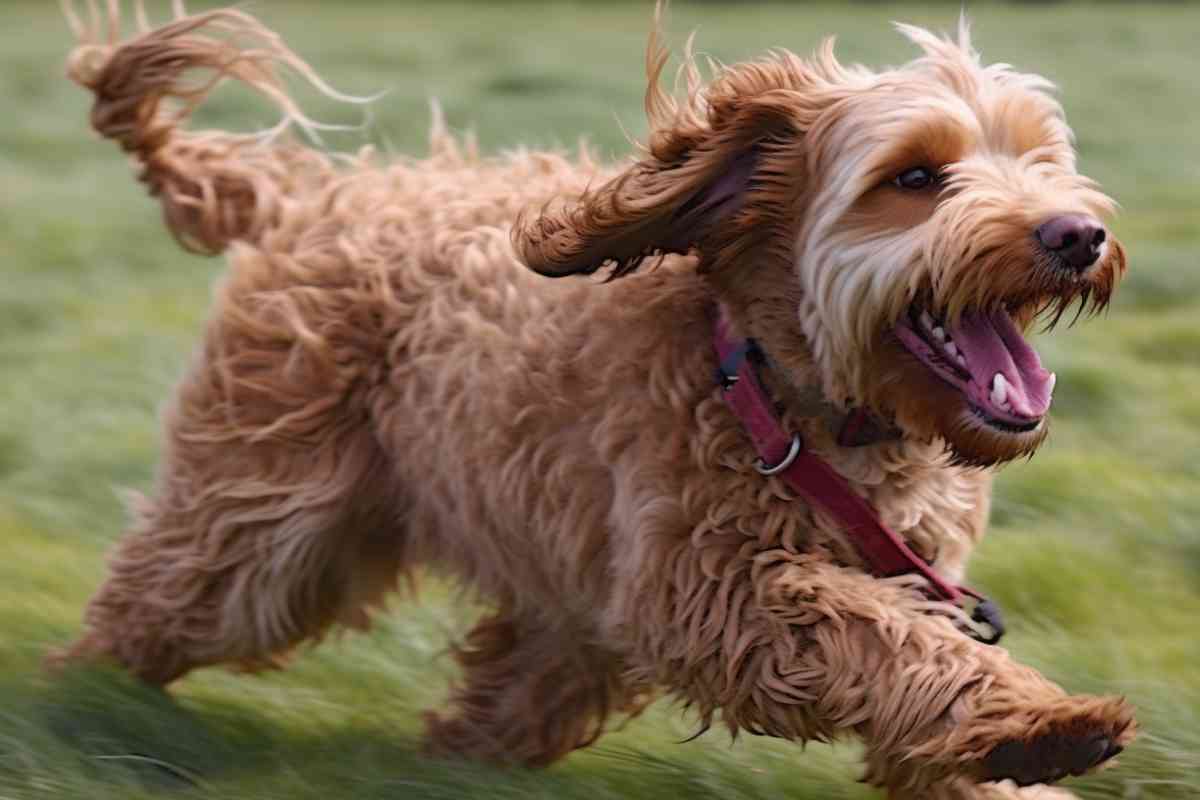Understanding Goldendoodle Behavior: A Guide to Temperament, Personality, and Traits
Goldendoodles, a delightful blend of golden retriever and poodle, bring the best of both worlds, offering a rich tapestry of endearing and fascinating behaviors.
In this guide, we delve into the inherited traits that shape the personality and temperament of this popular hybrid breed. Join us as we unravel the behaviors that make Goldendoodles the charming and intelligent companions they are known to be.

Understanding Goldendoodle Behavior?
A Goldendoodle’s behavior is generally affectionate, loyal, and playful. It enjoys being active and spending time around people and other dogs. Since Goldendoodles can be deeply attached to their owners, they can easily get separation anxiety when left alone for too long.
Goldendoodles can be great family pets due to their gentle and loving nature, but they’re not for everyone. Here’s what you need to know about this breed to help you make an informed decision. These are some related posts you may find interesting:
- Goldendoodle Behavior Stages: Understanding Your Dog’s Development
- Calmest Doodle Breeds: Top 5 Low-Key Pups for Your Home
Though this mixed breed dog may have traits that appeal to your family, some traits might not work well for your living situation. When considering if a dog fits your family’s needs, you should also think about whether you can adequately accommodate the dog’s needs.

Understanding Goldendoodle Behavior
| Trait Category | Golden Retriever Traits | Poodle Traits | Overlaps Likely in Goldendoodles |
|---|---|---|---|
| Behavior | |||
| Retrieving | Common (fetching games) | Common (fetching games) | Likely to enjoy retrieving games |
| Swimming | Loves swimming | Loves swimming | Likely to enjoy water and swimming |
| Chasing | Prone to chasing | Moderate tendency to chase | Likely to have a moderate to high chasing instinct |
| Jumping on hind legs | Rare | Common (from circus background) | May occasionally exhibit this behavior |
| Guarding | Less common | More common (can be protective) | May exhibit guarding behavior, depending on individual personality |
| Personality | |||
| Affability | More affable | More reserved | Likely to be friendly with a range of openness to people |
| Reactivity | Less reactive | More reactive and sensitive | May vary, could be reactive depending on situations |
| Temperament | |||
| Stability | More stable | Slightly more sensitive | Likely to have a balanced temperament, with individual variations |
| Sensitivity | Less sensitive | More sensitive | May exhibit a range of sensitivity levels, depending on upbringing and individual personality |

Looking For A Goldendoodle Puppy?
Whether you are single or have a large family, a Goldendoodle can make an excellent family dog, adapting well to a variety of living situations.
However, you should carefully consider your lifestyle when deciding if a Goldendoodle will be a good pet for you.
Though Goldendoodles can do well on their own for short periods of time, they might develop separation anxiety when left alone for extended periods.
If your job or other commitments require you to frequently travel and be away from home without your dog, it might not be the best idea to own a Goldendoodle.
The Goldendoodle’s temperament is best nurtured with constant activity and attention from pet owners or anyone willing to play and interact with them.
If you cannot provide the right environment for a Goldendoodle, it might not be wise to add this breed to your household.
Many dogs become more accustomed to their situation as time goes on, so adopting a Goldendoodle puppy might work if you work with them.
Understanding the Personality Variability in Goldendoodle Puppies
When it comes to predicting the personality traits of hybrid breeds like the Goldendoodle, it’s a fascinating exploration into the world of genetics and inheritance.
The Goldendoodle inherits traits from both parent breeds, which, while having similarities, also possess distinct differences in their temperaments. Let’s delve deeper into how the interplay of these traits can influence the personality of Goldendoodle puppies.
The Common Ground: Loyalty and Trainability
Both Golden Retrievers and Poodles are renowned for their loyalty and high trainability.
These breeds are eager to please, intelligent, and responsive to training, which makes them excellent companions.
Consequently, Goldendoodle puppies often exhibit these favorable traits, showcasing a keen intelligence and a deep-seated loyalty that makes them wonderful family pets.

The Diverging Traits: Sensitivity Versus Affability
Poodles tend to be more sensitive and reserved, often showcasing a dignified demeanor. In contrast, Golden Retrievers are generally more outgoing, affable, and wear their hearts on their furry sleeves, so to speak.
Goldendoodle puppies can exhibit a wide spectrum of behaviors. Some might lean towards the sensitive and reserved nature of the Poodle, while others may inherit the Golden Retriever’s outgoing and friendly disposition.
Finding the Middle Ground
Most Goldendoodles find a harmonious middle ground, inheriting a balanced blend of the sensitivity and reservation of the Poodle with the affable nature of the Golden Retriever.
This results in a personality that is both receptive and warm, yet composed and respectful of boundaries, offering the best of both worlds.
Socializing Goldendoodles: Navigating the Fear Phases and Beyond
As your Goldendoodle pup grows, they will go through several fear phases, the first occurring around 8-10 weeks of age and another as they enter adolescence. During these phases, they might be more reactive or selective in their interactions.
It is crucial to be patient and understanding during these periods, guiding them gently through new experiences.
Expert Tip: Maintain a calm demeanor to help your pup navigate their fear phases with confidence.
Gender Preferences in Socialization
It is often observed that dogs tend to get along better with the opposite gender. While this is not a hard and fast rule, it can be a good guideline to follow when introducing your Goldendoodle to potential furry friends.
Structured Playdates Over Dog Parks
While some Goldendoodles turn out to be the life of the party at dog parks, a more controlled environment like structured playdates can often be a safer bet.
It allows for gradual introductions, helping your doodle to build confidence and social skills in a controlled setting.
Expert Tip: Start with one-on-one playdates before gradually introducing more dogs to the mix.

Dog Parks: A Mixed Bag
While structured playdates are generally recommended, don’t rule out dog parks entirely. Many doodles enjoy the vibrant and social environment of a dog park, showcasing their golden retriever trait of being friendly and open.
Expert Tip: If you choose to visit a dog park, ensure to keep a close eye on your doodle to prevent any unwanted incidents.
Decoding Goldendoodle Behaviors: A Glimpse into Their Rich Ancestry
The Chase and the Retrieve
A walk by the lake can quickly turn into a playful chase if your Goldendoodle spots ducks. This is because they inherit a strong prey drive from their retriever lineage, which often involves chasing and bringing things back, especially from water.
This retrieving instinct is a nod to their ancestors who were adept at fetching waterfowls for hunters.
The Dancing Doodle
If you find your Goldendoodle often standing on its hind legs, you are witnessing a behavior that traces back to the poodle’s history as circus performers.
This act of balancing on the hind legs is not just a playful antic but a testimony to the agility and balance that poodles brought to circus rings, captivating audiences with their grace.
The Pointing Instinct
Both golden retrievers and poodles have a rich history in hunting, a trait that is sometimes visible in Goldendoodles when they exhibit pointing behaviors.
This involves using their body to point towards something of interest, a behavior rooted in the hunting instincts ingrained in both parent breeds. It is a silent yet expressive way of communicating their curiosity and alertness.
The Love for Water
Goldendoodles often have a natural affinity for water, a trait they inherit from both their parent breeds, which have historical roles associated with water.
Whether it is jumping into a lake in pursuit of ducks or enjoying a splash in the pool, their love for water is a delightful expression of their retriever and poodle genes, both of which were bred to excel in water-related tasks.
Conclusion
Understanding the rich ancestry of Goldendoodles offers a fascinating lens to appreciate their behaviors more deeply.
From the playful chase to the graceful stand on the hind legs, each behavior tells a story of a rich heritage that is alive in the joyful and spirited personality of Goldendoodles.

Activities
In terms of physical behavior, a Goldendoodle is one of the most high energy dogs of any dog breed.
Off-Leash Playtime
Allowing your Goldendoodle some off-leash time in a secure environment can be a great way to burn off energy. It gives them the freedom to explore and play with their littermates or other doodles.
Expert Tip: Always supervise off-leash playtime to prevent any health issues or accidents.
Hiking and Outdoor Adventures
Goldendoodles are known for their medium to high energy levels, making them great companions for hiking and other outdoor adventures.
Their hybrid vigor often means they are healthier and more robust, ready to explore the great outdoors of North America and beyond.
Expert Tip: To prevent hip dysplasia, a common issue in this breed, choose trails that are not too steep or hard and provide ample opportunities for rest.
Obedience Training
Obedience training is not just an activity but a necessity. It helps in nurturing well-behaved pups and fosters a strong bond between the pet and the owner.
Crate training can be a part of this regimen, teaching them to stay calm during long periods of time.
Expert Tip: Reward them with treats during training sessions to encourage positive behavior.
Grooming Sessions
Regular grooming sessions are not just for maintaining their silky coats and avoiding matting but can be a bonding activity too. It involves regular brushing to prevent matting and ear infections, which are common due to floppy ears.
Expert Tip: Make grooming a rewarding experience by offering treats and praises. Consider taking your doodle to professional groomers for the best results.
Competitive Activities for Goldendoodles: A Guide to Engaging Your Pup
Goldendoodles stand out in competitive activities. Their popularity and success have seen them become favorites in various competitive arenas.
Here, we explore some competitive activities that are suitable for Goldendoodles and tips on how to excel in them.

Agility Competitions
Agility competitions are a fantastic way for Goldendoodles to showcase their agility and obedience training. These events involve navigating a series of obstacles in a set time frame.
Dock Diving
Goldendoodles with a love for water will excel in dock diving, a competition where dogs are judged based on the distance they can jump into a body of water.
Expert Tip: Begin with short jumps and gradually increase the distance to help your doodle become a champion dock diver.
Flyball
Flyball is a relay race that involves teams of dogs racing against each other over a line of hurdles to retrieve a ball. It’s a great way for Goldendoodles to socialize with their littermates and other dogs while enjoying a spirited competition.
Disc Dog Competitions
Disc dog competitions allow Goldendoodles to showcase their catching and retrieving skills. It involves throwing a disc or a frisbee to a distance, and the dog has to catch it.
Canine Freestyle
Canine freestyle, often referred to as dog dancing, is a choreographed performance organized with music involving a dog and human team. It’s a delightful way to showcase the harmonious relationship between you and your Goldendoodle and they’re very good at it, thanks to their circus dog Poodle ancestry.
Expert Tip: Incorporate tricks your doodle already knows into the routine and choose music that complements your doodle’s tempo.

Goldendoodles as Therapy or Service Dogs: Identifying the Right Fit
Goldendoodles, with their gentle disposition and intelligent nature, are popular choices as therapy and service dogs. These roles require a specific set of behavioral traits and temperaments to ensure that the dog can adequately assist and support individuals in various settings.
Let’s explore how to determine if a Goldendoodle’s behavior indicates they are well-suited for such important roles.
Understanding the Requirements
Before delving into the behavioral indicators, it is essential to understand the requirements for a therapy or service dog.
These dogs need to be calm, patient, and able to work well in diverse environments. They should be trainable to perform specific tasks or to provide emotional support to individuals with various needs.
Behavioral Indicators of a Suitable Candidate
When assessing a Goldendoodle for therapy or service work, pay attention to the following behavioral traits:
- Temperament: A good candidate should exhibit a stable and calm temperament. They should not be overly aggressive or excessively shy.
- Socialization Skills: Goldendoodles suitable for this role should be well-socialized and comfortable interacting with both people and other animals.
- Trainability: A high level of trainability is a must. The dog should be eager to learn and able to pick up new commands relatively quickly.
- Patience: Therapy and service dogs often work in environments where they need to remain calm and patient for extended periods. A Goldendoodle that can settle quietly and maintain composure in various settings is ideal.
- Sensitivity: A sensitive dog can tune into human emotions effectively, making them excellent companions for therapy work.
Testing the Waters
Before making a decision, it is advisable to test your Goldendoodle in different environments to see how they respond.
Engaging them in training programs and observing their reactions to various stimuli can provide valuable insights into their suitability for therapy or service work.
Consulting with Professionals
If you believe your Goldendoodle shows promise as a therapy or service dog, the next step is to consult with professionals who specialize in training service dogs.
They can offer a more detailed assessment and guide you on the necessary training pathway.
Conclusion
Goldendoodles, with their friendly disposition and trainable nature, can be great competitors in various dog sports and activities. Engaging your doodle in competitive activities not only provides physical exercise but also stimulates their mind, promoting a happy and healthy life. Remember to consult with a veterinarian or a reputable breeder for guidance in choosing the right competitive activity for your Goldendoodle.

Understanding and Addressing Common Goldendoodle Behavior Problems
Like all breeds and mixes, Goldendoodles can develop some behavior problems. Understanding the common issues and how to address them can help in nurturing well-behaved and happy pups.
Separation Anxiety
Goldendoodles can develop separation anxiety, especially if left alone for long periods of time. This can lead to destructive behaviors such as chewing on furniture and excessive barking.
What to Do: Gradually acclimate your doodle to being alone, starting with short durations and gradually increasing the time. Crate training can be a helpful tool in managing separation anxiety.
Aggression
Though it is uncommon, Goldendoodles can exhibit aggressive behaviors, possibly stemming from fear or territoriality. This can be exacerbated during their fear phases as they grow.
What to Do: Early socialization and obedience training can help in curbing aggressive tendencies. If the problem persists, consider seeking the help of a professional dog trainer.
Excessive Barking
Some Goldendoodles may develop a habit of excessive barking. This could be a way to seek attention or a response to unfamiliar noises and environments or get attention for people not able to handle their need for engagement.
What to Do: Identifying the cause of the barking and addressing it is crucial. Training your doodle to respond to a “quiet” command can be beneficial. Also, make sure your dog is getting plenty of mental stimulation and physical exercise.
Jumping Up on People
Goldendoodles are friendly and may often jump up on people as a way to greet them. Poodles love to be on their hind legs, a testament to their circus days and a trait often inherited by doodles. While it is a sign of affection, it can be problematic, especially when kids are involved.
What to Do: Training your doodle to greet people politely with all four paws on the ground, possibly through reward-based training, can be an effective solution.
Chewing
Puppies, including Goldendoodles, go through a teething phase where they tend to chew on things. However, if not addressed, this can develop into a persistent problem.
What to Do: Provide appropriate chew toys for your doodle and encourage them to use these toys through positive reinforcement.
Resource Guarding
Goldendoodles may sometimes exhibit resource guarding behavior, where they become protective of their food, toys, or treats. This behavior can develop due to various reasons, including competition with littermates during their early weeks of age.
What to Do: Training your doodle to follow commands like “leave it” and “drop it” can be helpful in managing resource guarding behaviors.
The Importance of Choosing a Reputable Breeder for Your Goldendoodle
When bringing a Goldendoodle into your family, it is crucial to ensure that you are sourcing your new family member from a reputable breeder.
The breeding environment significantly influences the temperament and behavior of Goldendoodles, and unfortunately, not all breeders prioritize the well-being and genetic health of the pups they are raising.
The Perils of Unethical Breeding
Puppy mills and backyard breeders often prioritize profit over the welfare of the animals. In such environments, Goldendoodles may be bred without proper health screenings and in conditions that do not meet the necessary standards for a healthy upbringing.
This lack of care and attention can lead to a range of problems, including poor temperament and behavior issues such as fearfulness and aggression.
Regression to a More Feral State
When dogs are bred without careful consideration to their genetic health and upbringing, they tend to regress to a more feral state.
This means that they can exhibit behaviors such as heightened fearfulness, aggression, and difficulties in forming bonds with humans.
These behaviors are not just distressing for the dog, but can also pose challenges for families who bring them into their homes, hoping for a loving and affectionate companion.
The Value of a Reputable Breeder
Choosing a reputable breeder who understands the importance of ethical breeding practices is vital. Reputable breeders prioritize the health and temperament of the Goldendoodles they raise, ensuring that they are bred from healthy parents and raised in environments that nurture their physical and emotional well-being.
This approach fosters pups that are well-adjusted and ready to become loving members of their new families.
Supporting Ethical Practices
By choosing to buy from a reputable breeder, you are not only giving yourself the best chance of bringing home a Goldendoodle with a good temperament but also taking a stand against unethical breeding practices.
It is a step towards promoting the welfare of all dogs, ensuring that they are raised in loving and caring environments that respect their needs and dignity.